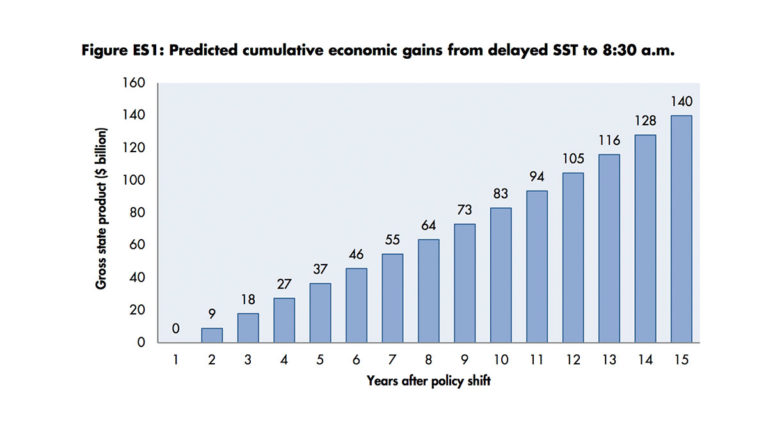Delaying School Start Times
Later school start times improve academic performance and mental and physical health for adolescents, as well as safety for the general public.

Read Time: 2 minutes
Published:
“It’s 6 o’clock in the morning, pitch black outside. My 14-year-old son is fast asleep in his bed, sleeping the reckless, deep sleep of a teenager,” begins Wendy Troxel’s TEDx talk. “I flip on the light, and physically shake him awake… Every morning I ask myself, how can I – knowing what I know and doing what I do for a living — be doing this to my own son?”
Troxel’s talk continues on to explain the harmful consequences of waking her teenage son “hours before his natural biological clock tells him he’s ready.” Learning, memory consolidation and emotional processing are all associated with adequate amounts of sleep, she says.
Wendy Troxel is a sleep researcher, and she recently collaborated with colleagues Marco Hafner and Martin Stepanek on an economic analysis of later school start times (SST) in the United States. Published by the RAND Corporation, the report conveys the researchers’ findings that later school start times are a cost-effective, population-based prevention strategy to improve academic performance and mental and physical health for adolescents, as well as safety for the general public.
Currently, about 80 percent of schools begin before 8:30 a.m. despite recommendations otherwise. The study says that the most significant barrier to implementation is the concern that shifting to later SST will involve additional, unmanageable costs for schools and parents related to changing bus schedules and child-care.
As the graphic above illustrates, however, public policies that delay SST until 8:30 a.m. could have an overall economic gain of about $9.3 billion per year, for an approximate total of $140 billion after 15 years. As the report points out, this yearly savings is equal to “roughly the annual revenue of Major League Baseball.”
Databyte via Marco Hafner, Martin Stepanek, and Wendy M. Troxel, Later School Start Times in the U.S.: An Economic Analysis. Rand Corporation.



